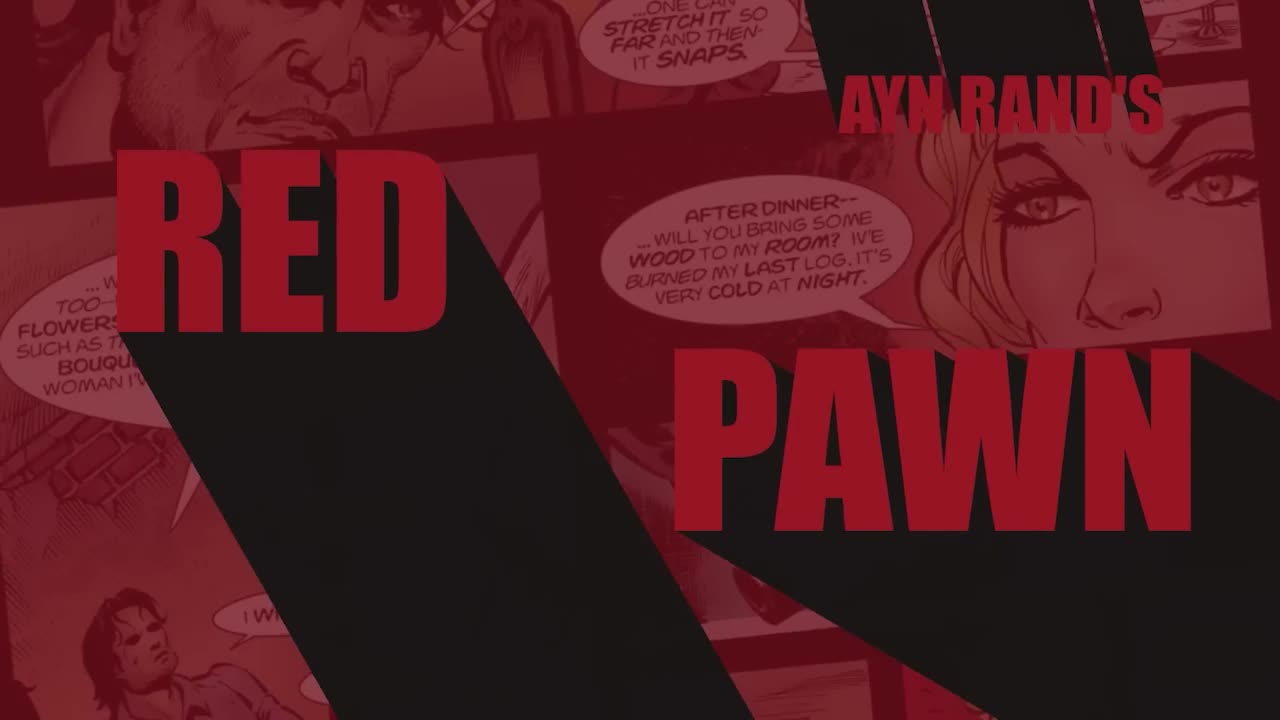Premium Only Content

'Red Pawn' (1932) by Ayn Rand
Ayn Rand’s early, lesser-known work, 'Red Pawn' (written in 1932) holds immense value in understanding the genesis of her moral and political philosophy. Though it was never produced as a film, 'Red Pawn' remains her first sold screenplay and stands as a dramatic precursor to the themes she would later develop more fully in 'We the Living', 'Anthem', and 'The Fountainhead'. Set against the backdrop of Soviet oppression, 'Red Pawn' is a tale of ideological confrontation, sacrifice, and the individual’s desperate bid for freedom amidst totalitarian control.
Plot Overview: 'Red Pawn' takes place on Strastnoy Island—literally “Island of the Damned”—a fictional Soviet penal colony. The story follows Joan Harding, an American woman who infiltrates the prison under the guise of being the wife of the commander, Commissar Kareyev. Her true motive is to rescue her actual husband, Michael Volkontzev, an imprisoned anti-Communist intellectual. As the story unfolds, Joan finds herself entangled not only in a dangerous love triangle between herself, Kareyev, and Volkontzev, but also in the ideological web of Communist loyalty, human passion, and moral compromise.
The drama culminates in a tragic, almost operatic crescendo, where love and loyalty are tested against the machinery of Soviet control. Kareyev, despite his duty to the Party, is seduced—emotionally and intellectually—by Joan’s honesty and courage, forcing him to choose between his principles and his orders.
Themes and Ideology: At its core, 'Red Pawn' is a powerful denunciation of collectivist regimes. Rand uses the claustrophobic prison setting to symbolize the moral and spiritual confinement imposed by Soviet ideology. The characters’ fates are inextricably linked to their moral choices, a hallmark of Rand’s future Objectivist philosophy.
Joan, the central figure, is a prototype of Rand’s later heroes—uncompromising, intelligent, and morally resolute. Her willingness to risk everything for her husband’s freedom exemplifies Rand’s admiration for individual sacrifice in the service of values, not duty. Kareyev is perhaps the most complex character: a man torn between loyalty to the State and a dawning admiration for individual courage. His internal conflict foreshadows the moral crises of characters like Andrei Taganov in We the Living or Dominique Francon in 'The Fountainhead'.
The title, 'Red Pawn', carries multiple meanings. On one level, it suggests that the characters are mere pieces in the grand ideological chess game of Communism. On another, it suggests the possibility that even within a system that treats people as pawns, individual agency—however constrained—can still exist.
Dramatic and Cinematic Merit: Although written for the screen, 'Red Pawn' reads more like a stage play, driven by intense dialogue and tight, internal conflict. Its film noir aesthetic and tight dramatic structure make it well-suited for a visual medium, but its heavy political and ideological content may have deterred Hollywood at the time. Rand herself would later lament that American studios were unwilling to portray the Soviet Union in a negative light in the early 1930s, a period of political sympathy for socialism in many Western artistic circles.
Despite its brevity, 'Red Pawn' manages to deliver a profound moral and philosophical critique. It is both a suspenseful drama and a tightly packed ideological statement—something few screenplays of the time attempted.
Legacy and Significance: Though 'Red Pawn' was never filmed, it was an important early milestone in Ayn Rand’s career. It established her as a screenwriter with a strong political voice and led to her later involvement in Hollywood, where she continued to write screenplays and eventually returned to fiction. The themes of 'Red Pawn' - freedom vs. tyranny, love vs. ideological duty, and the moral autonomy of the individual—would be reworked and amplified in her major novels.
For readers interested in Rand’s development as a writer and thinker, 'Red Pawn' is essential. It’s raw and not as polished as her later works, but its power lies in its clarity of purpose and the emotional intensity of its characters. It is also one of the few works where a woman—Joan—is the active agent of rescue and rebellion, which adds another layer of interest to Rand’s otherwise male-dominated heroics.
Conclusion: 'Red Pawn' is an early but potent glimpse into the core convictions of Ayn Rand. While it lacks the scope and polish of her later masterpieces, it serves as a compact, emotionally rich exploration of the moral tension between freedom and collectivism. The screenplay stands as both a warning and a testament: that in the bleakest systems, the flame of individual will can still burn—and sometimes, ignite the heart of even the most committed ideologue.
-
 LIVE
LIVE
Redacted News
1 hour agoMichael Jackson Murdered in Epstein Pedophile Cover-Up? W Ian Carroll
6,953 watching -
 1:05:09
1:05:09
Russell Brand
4 hours agoRestore Britain Emerges as the Epstein Saga Deepens — SF684
94.3K18 -
 1:18:38
1:18:38
vivafrei
2 hours agoDeenTheGreat FAFO? Canadian Conservatitive MP Thrown UNDER THE BUS! Epstein Fallout Continues & MORE
20K12 -
 LIVE
LIVE
John Crump Live
1 hour agoTHEY Are Trying To Destroy This American Gun Company
57 watching -
 6:09
6:09
realmuckraker
21 hours agoNYC Election Official Admits Non-Citizens Register to Vote
231 -
 1:13:02
1:13:02
The Quartering
3 hours agoToday's Breaking News LIVE!
109K22 -
 49:17
49:17
Mark Levin Show
5 hours agoREMEMBERING RUSH
22.8K34 -
 LIVE
LIVE
The HotSeat With Todd Spears
1 hour agoEP 253: Elon Ponders Christ… But Sharia Says Your Dog’s Unclean? Faith vs Freedom!
711 watching -
 LIVE
LIVE
Film Threat
22 hours agoROGER AVARY LIVE INTERVIEW! | Hollywood on the Rocks
59 watching -
 LIVE
LIVE
The Tom Renz Show
1 hour agoHospital Homicides, Medical Kidnapping, mRNA, and the Return of FEMA Camps
177 watching